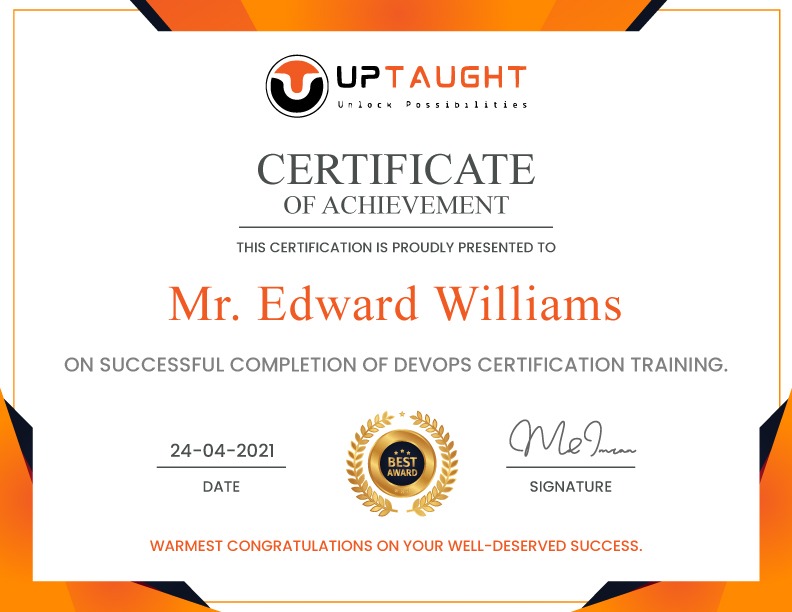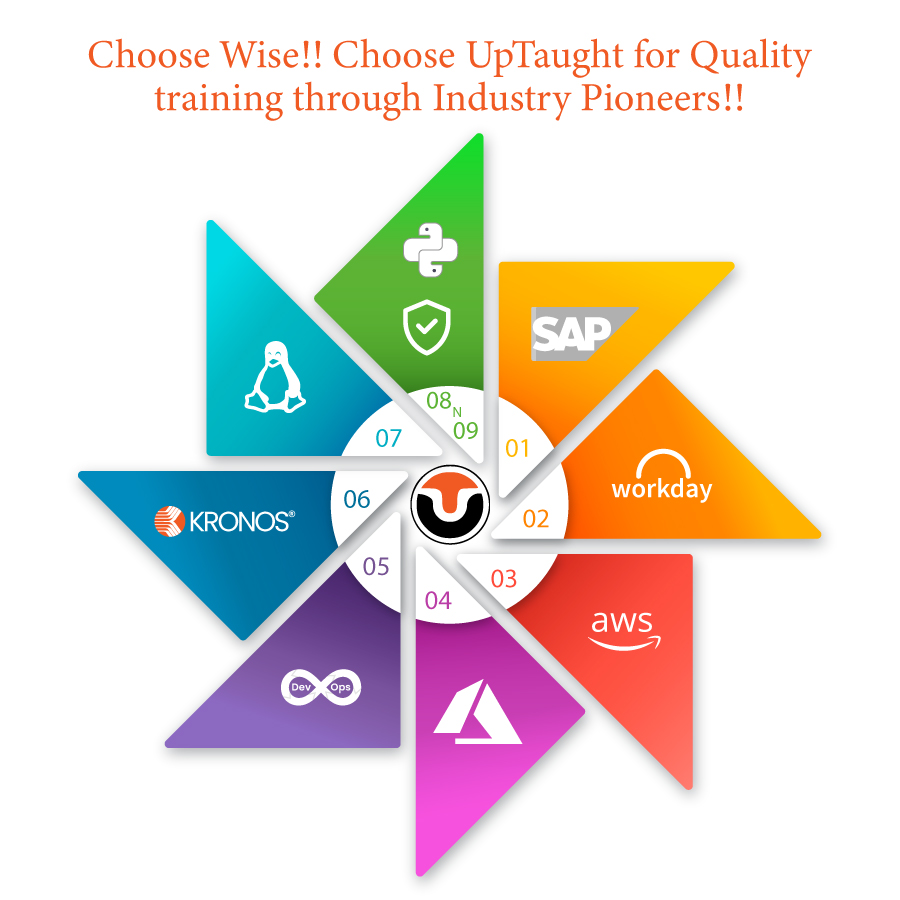DevOps Certification Training
Learn DevOps and build your skills with UpTaught. Are you completely new to DevOps or do you want to upskill your DevOps knowledge to get a better understanding, then you are at the right place!
Our DevOps Online Training program is designed by industry experts, which will provide in-depth knowledge on various DevOps Concepts & tools in a way to help you master and prepare you for a career in DevOps.
In 36 Hours of Instructor-led Live Online Training, you will master the key trending DevOps tools like Ansible, Docker, Git, Jenkins, Kubernetes, Nagios & Puppet, which is in line with the industry expectations. Our unique blended online training is completely hands-on with interactive lab sessions, giving you job-ready skills.
-
LevelAll Levels
Start Date
Time
Duration
Type
Mode of Training
Course Curriculum
Chapter 1 – Installation of DevOps Tools on Cloud
-
Git
-
Docker
-
Maven
-
Jenkins
-
Puppet
-
Ansible
-
Kubernetes
-
Nagios
Chapter 2 – Overview of DevOps
-
What is Software Development
-
Software Development Life Cycle
-
Traditional Models for SDLC
-
What is DevOps?
-
Why DevOps?
-
DevOps Market Trends
-
DevOps Lifecycle
-
DevOps Delivery Pipeline
-
DevOps Engineer Skills
Chapter 3 – Source Code Management – Git & GitHub
-
Why SCM?
-
What is Version Control?
-
Types of Version Control
-
What is Git?
-
Why Git for your Organization?
-
Install Git
-
Common Commands in Git
-
Working with Remote Repositories
-
Branching; Merging and working with various Git Commands
-
Stashing, Rebase and Revert
-
GitHub (as Git Server)
-
Git Workflows
-
Webhooks
-
Cherrypick
Chapter 4 – Continuous Build & Integration – Jenkins & Maven
-
What is CI?
-
Why CI is required?
-
Introduction to Jenkins & Maven
-
Maven Architecture
-
Security
-
Jenkins Admin
-
Jenkins Management
-
Addition of Slave node to Jenkins
-
Building Delivery Pipeline
-
Pipeline as a Code
Chapter 5 – Continuous Testing – Selenium (Automation)
-
Introduction to Selenium
-
Why Selenium?
-
Creating Test Cases in Selenium WebDriver (Waits)
-
Implement Webdriver with TestNG
-
Overview Selenium IDE, Selenium WebDriver
-
Introduction to X-Path and TestNG
-
Executing tests using various browsers using Selenium
-
Selenium Integration with Jenkins
-
What and why X-Path
-
Handling different controls on Webpage
-
Framework in Selenium
-
Selenium Integration with Jenkins
Chapter 6 – Configuration Management – Ansible
-
What is Ansible?
-
Ansible vs Puppet
-
Ansible Architecture
-
Setting up Master Slave using Ansible
-
Ansible Playbook
-
Write Playbooks
-
Ansible Roles
-
Configuring Ansible Roles
-
Ad-hoc Commands using Ansible
-
Applying configuration using Ansible
-
Executing Adhoc Command
Chapter 7 – Continuous Deployment – Containerization & Docker
-
Shipping Transportation Challenges
-
Overview of Docker
-
Docker Architecture
-
Working with Images and containers
-
Running Hello world in Docker
-
Container Lifecycle
-
Working with Containers
-
Docker Hub / Repository
-
Docker Swarm for container orchestration
-
Docker Networking
Chapter 8 – Containerization with Docker – Ecosystem & Networking
-
What are Docker Volumes
-
Deploying a Multi-Tier Application using Docker Network
-
Using Docker Compose to deploy containers
-
What is Container Orchestration
-
Container Orchestration Tools
-
Introduction to Docker Swarm
-
Deploying a 2-Node Cluster using Docker Swarm
Chapter 9 – Configuration Management – Puppet
-
Need for Configuration Management
-
Configuration Management Tools
-
Introduction to Puppet
-
Puppet Installation
-
Puppet Configuration
-
Puppet Master and Agent Setup
-
Puppet Architecture
-
Setting up Master Slave using Puppet
-
Puppet Manifests
-
Puppet Modules
-
Applying configuration using Puppet
-
Puppet File Server
Chapter 10 – Continuous Orchestration – Kubernetes
-
Introduction to Kubernetes
-
Docker Swarm vs Kubernetes
-
Kubernetes Architecture
-
Deploying Kubernetes using Kubeadms
-
Alternate ways of deploying Kubernetes
-
YAML Files
-
Creating a Deployment in Kubernetes using YAML
-
Services in Kubernetes
-
Ingress in Kubernetes
Chapter 11 – Continuous Monitoring – Nagios
-
Introduction to Continuous Monitoring
-
Overview of Nagios
-
Installation & Configuration of Nagios
-
Nagios Architecture
-
Nagios Plugins(NRPE) and Objects
-
Nagios Commands and Notification
-
Monitoring Services in Nagios
-
NRPE Plugins
-
Monitoring System Info using NRPE Plugins
DevOps Certification Training
-
LevelAll Levels

Instructor Name : Sunil
Instructor Qualification : MySQL||Linux||Git||AWS||Terraform||Kubernetes||Ansible||Jenkins||Docker||Python
Instructor description:
- 10 years of experience in Development and release of Software products.
- Helped multiple startups as DevOps consultant to implement DevOps from scratch.
- Great communication skills and passionate towards teaching.
- Impeccable knowledge on DevOps and mentoring students through his real-time experience in various projects.
- Have trained students and helped them to set up a career path in DevOps
- Enjoys reading and learning new technologies and Knowledge sharing.
Roadmap
Salary range
FAQs
Pursuing a DevOps training course helps you to expertise in an ever-changing field if you are committed to your IT career. You can get more work done and provide better assistance to operations using DevOps automation capabilities.
You may provide your company with numerous verifiable benefits by acquiring a DevOps certification. The DevOps philosophy encourages greater collaboration and communication between the development and operations teams. Because of the shorter development cycle, the frequency of release code that gets into production has increased.
Yes! You will be well-versed in the DevOps delivery approach after completing DevOps training Course. DevOps encompasses all main and minor approaches and concepts. You will know how to use all of the most important DevOps tools.
DevOps Engineers are in charge of providing assistance to the users of the infrastructure they create, and the first line of defence is to keep the cloud safe from hackers and viruses. Of course, they do this with code, beginning with secure software.
System Administrators, Integration Specialists, Security Engineers, Application DevelopersSolution Architects, and Software Testers are among the professionals who will gain the most benefit from the DevOps Certification Training course.
The DevOps training course is suitable for novices. In fact, we encourage those with no prior knowledge of IT to attend this course. The reason for this is that we have built our course in such a way that even beginners will have no trouble grasping the topics.
DevOps is a workplace culture that encourages teams to collaborate and work toward a common goal. Developers feel more productive when DevOps concepts are in place because they can quickly fix errors. DevOps has also made it easier for developers to add new features to their applications. DevOps, in general, has improved team collaboration.
DevOps has resulted in a fundamental shift in the digital world. It has provided IT infrastructure with both assistance and security, resulting in positive results. As a result, the DevOps culture has influenced every IT domain that has anything to do with software, either directly or indirectly.
DevOps provides a Structured Career Path with Continuous Growth. You may also be a master in using various DevOps automation methodologies to tackle difficult ongoing problems. A good DevOps engineer must be able to balance several activities such as coding, integration, and testing.
Aspiring DevOps novices must educate themselves with the basic techniques they will employ in their jobs. You must thoroughly study the operating system’s basics, scripting, cloud, containers, and programming languages. Operating systems serve as the foundation upon which everything else is built.
DevOps has a great future ahead of it. DevOps’ practical applications are rising by the day. The compensation of a DevOps Engineer in India reflects the high demand for DevOps.
Python would be your first programming language required. Although there are legitimate arguments for several other languages, Python is an excellent place to begin. This seems to be valid in the context of DevOps. Python is primarily used for backend development and scripts.
It’s no wonder, then, that organizations around the world are rapidly adopting DevOps-related technologies and methods for continuous integration and delivery of software-based goods and services. DevOps specialists are in high demand as organizations continue to remain ahead of their competition by implementing DevOps-related techniques. Leading job search forums such as Indeed have seen a 75 percent spike in DevOps job listings, while social media sites such as LinkedIn have seen a 50 percent increase in mentions of DevOps as a skill.
4-5 months in total. If you would like to master DevOps from the finest, consider our DevOps Training course, which features instructor-led training and hands-on assignments.
DevOps is simple and easy to understand, but it requires time to master as it adjusts in mentality and practice. Individuals with both technical and non-technical backgrounds are drawn to DevOps.





